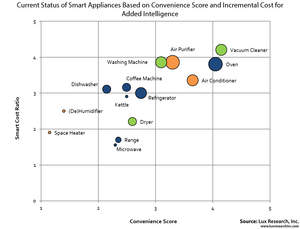BOSTON, MA--(Marketwired - Jul 12, 2016) - Makers of smart home appliances have begun to focus on features that enhance consumer convenience but prices remain too high for wider adoption, according to Lux Research.
The large manufacturers also have overlooked opportunities in environmental control and retrofitting of older products with long life cycles, opening the doors for startups.
"Current prices are three times higher and will have to be lower for manufacturers to push smart appliances for mass adoption," said Jessica Hernández, Lux Research Associate and lead author of the report titled, "Smart Appliances: Delivering the Next Level of Convenience in the Home."
"Also, businesses can benefit by focusing on retrofit technologies as a bridge for smart appliance adoption, drawing in products such as refrigerators and air conditioners that have a long life cycle," she added.
Lux Research analysts evaluated market opportunities for makers of smart appliances in three distinct categories -- kitchen, cleaning and environmental control. Among their findings:
- Samsung tops in product range. Samsung leads in the number of smart appliances in the market with eight, while LG, Whirlpool, Mabe/GE and Haier have seven each. Samsung, Haier, and Mabe/GE are the only three with products across three major market segments -- kitchen, cleaning and environmental control.
- Environmental control is a need. The recent explosion of indoor air quality monitoring devices -- addressing a growing area of concern across many parts of the world -- is opening the door to new entrants such as Sprimo and existing players such as Dyson, which aim to actively manage indoor air quality by developing smart air purifiers.
- Future is in "Connected Kitchen." While some early products add intelligence to kitchen appliances, there is an opportunity to build a "connected kitchen," integrating multiple smart appliances. A startup called Innit already plans to connect people with food through software, databases and connected appliances.
The report, titled "Smart Appliances: Delivering the Next Level of Convenience in the Home," is part of the Lux Research Intelligent Buildings Intelligence service.
About Lux Research
Lux Research provides strategic advice and ongoing intelligence for emerging technologies. Leaders in business, finance and government rely on us to help them make informed strategic decisions. Through our unique research approach focused on primary research and our extensive global network, we deliver insight, connections and competitive advantage to our clients. Visit www.luxresearchinc.com for more information.
Contact Information:
Contact:
Carole Jacques
Lux Research, Inc.
617-502-5314
carole.jacques@luxresearchinc.com
